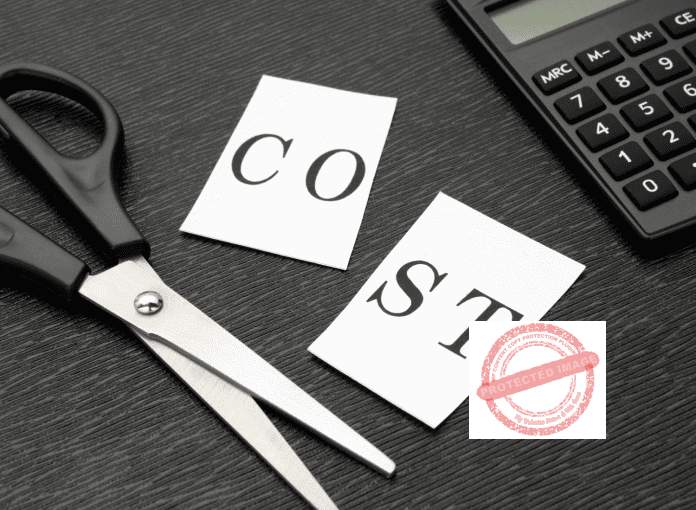What is Fixed Cost in Business? There are so many types of business expenses, one of which is fixed costs. In this post, we’ll delve deep into what is fixed costs in business.
You’ll discover what fixed costs are in business, how they are different from variable costs, and even how you can reduce your fixed costs to generate maximum profit.
Meaning of Fixed Costs – What is Fixed Cost in Business
Fixed costs refer to the expenses a business always has to pay, regardless of whether the company is doing well or not or its activity level.
Fixed costs are often constant and they do not change depending on the business’s operations or the number of products or services the company sells.
One good example of fixed costs is rent.
If you run your business in a rented property, you know you have to pay your rent at the end of every billing cycle.
When you fail to pay rent, the property owner will ask you to vacate the property.
Now, regardless of whether your business has been slow or successful, it doesn’t matter.
At the end of the billing cycle, all the property owner you are renting from wants is to receive payment.
So, whenever you feel confused about whether an expense constitutes a fixed cost or not, ask yourself if you always have to pay for that particular thing regardless of your business’s current state.
Key Characteristics of Fixed Costs
To help you understand this business expense better, let us look at some key characteristics that all fixed costs possess.
Fixed costs:
- Don’t depend on your business’s level of services or goods.
- Are recurring expenditures; you have to pay them on a constant basis according to the agreement, this could be monthly, quarterly, or yearly.
- Are typically based on schedules or agreements; so, they don’t change during the period of the agreement.
- Don’t change according to a company’s production or activity levels.
- Can be reduced per unit if the fixed cost is based on the company’s direct cost.
Variable Costs Vs Fixed Costs – What is Fixed Cost in Business
When it comes to business expenses, you can generally classify them into fixed and variable costs.
If an expense isn’t a fixed cost, it will definitely be a variable cost.
Hybrid expenses, known as semi-variable costs, exhibit some characteristics of both variable and fixed costs.
Whenever you talk about fixed costs, you most likely will also hear variable costs.
So, what exactly is a variable cost?
Well, variable costs are the exact opposite of fixed costs.
You already know that fixed costs do not change regardless of business performance, it is always constant.
The production rate and success of a company determine variable costs on the flip side.
They often change based on the business’s success and how much activity is going on in the company.
If a company is doing well, the variable costs will most likely increase.
But if the business is slow, variable costs will most likely reduce.
A good example is office supplies.
If the activity level is high in the office, you will have to get more office supplies than when the business activity level is low.
This means that you may spend 1000 dollars on office supplies when things are moving slowly in your company.
But you can later spend double that amount when things pick up in your company.
Now, you have a clear picture of how variable costs differ from fixed costs.
But to make things clearer, let’s closely look at the two major differences between these business expenses.
Nature of the Expense- What Is Fixed Cost In Business
The first major difference between variable and fixed costs is their nature.
Fixed costs are time-based.
Their prices remain constant for a given period which the agreement often states.
This means that a business would always know how much they have to pay for their fixed expenses.
Making it easier for them to make plans for them.
Variable costs on the other hand are unstable in nature.
They may either increase or decrease depending on various determining factors.
This makes it more difficult to make concrete plans for them.
Production Influence
The level of production or company activity has a major impact on variable costs.
However, fixed costs do not depend on a business’s output levels or the profit it generates.
So, even if a company does not make sales, it still has to pay its fixed costs to stay in business.
Examples of Fixed Costs – What is Fixed Cost in Business
The following are some common examples of fixed costs that most companies will likely experience:
Rent
One very good and common example of fixed costs is rent.
If your business uses a rented property for any of its office processes, then you would have to pay rent for the property every billing cycle.
This is a fixed cost because you will incur this cost, regardless of the state of your business.
Rents are also reoccurring expenses that you have to pay on a constant basis.
The rent agreement will carry the payment terms.
And the price you pay for rent will not change during the agreement period.
Interest Expenses
This is another fixed cost in business
Loans are one of the ways to fund a business.
From time to time, you may need to take out a loan for your business.
And unless you are borrowing funds from your friends or family members, loans often come with interest.
Loan interests typically have fixed interest rates.
So, you would have to pay a particular amount of money at regular intervals for your loan interest.
Interest expenses are fixed costs because the interest rates are fixed.
Insurance Premiums
A company has to protect itself from liabilities among other things that can cause financial loss.
And the best way to do this is with insurance.
There are so many insurance packages for businesses and the type of insurance you get for your business is often based on your business needs.
Businesses with insurance have to pay insurance premiums.
As a business owner, you would have to pay your insurance premium as long as you want to keep having the insurance.
Your business’s activity levels or success won’t affect this cost in any way.
Utilities – What is Fixed Cost in Business
Utilities include expenses like electricity, waste management service, phone, water, and internet bills.
These are perfect examples of semi-variable costs.
This is because they have both characteristics of variable and fixed costs.
However, you can consider them a fixed cost in business because they are recurring that you have to pay at the end of every billing cycle.
However, the cost of the service may change according to the way the company uses it.
That is, the activity level in the company can affect utility costs.
Salaries
This is another fixed cost in business that most companies incur,
Unless you do not have any employees in your business, you cannot avoid this expense.
Your employee’s salaries are most likely constant and would likely only change after a while.
How Fixed Costs Work – What is Fixed Cost in Business
There are several categories of costs that every business regardless of type or size has to pay.
Categorizing costs is vital to keeping the financial structure of a business organized.
It also helps business owners make good financial decisions for their companies.
Most business owners will categorize costs into 3 distinct classes; direct costs, indirect costs, and capital.
Let’s take a closer look at these various categories of business expenses.
Direct Costs
Direct costs directly relate to the costs of a company’s services or goods.
That is to say, it is what a company has to spend to produce or get the services or goods that it offers its customers.
Therefore, a company’s success often affects the price of direct costs.
For instance, let’s say a company sells off all its stock.
If this happens, the company will have more revenue which they can then use to pay for more raw materials so that they can have more stock.
Indirect Costs
Indirect costs on the other hand do not relate to the costs of services and goods that a company sells.
Therefore, business success will not have any impact on these costs.
Capital Costs
Capital is the money a business owner uses to start their business.
It is often a one-time thing.
Business owners often use this money to buy assets and other infrastructure that the business needs to become operational.
Apart from these three categories of business expenses, you can also classify business expenses as either short-term or long-term liabilities.
Now, all of these different categories of expenses fall under either the variable costs or fixed costs umbrella.
This is what makes fixed costs and of course, variable costs very important in business.
If you want to get a full picture of a company’s expenditure, all you have to do is review its variable and fixed costs.
By analyzing these two important classes of business expenses, you can determine a company’s profitability.
Fixed costs have a big influence on the profit margin of a business.
So, a lot of business owners often look for ways to cut down their fixed costs to increase their profits.
Contract agreements are also very important when it comes to fixed costs.
This is because a fixed cost can change with time.
But when you have a contract agreement, the change won’t affect your business until the agreement period is over.
You can also make your fixed costs cheaper by negotiating longer contract agreements.
Importance of Fixed Costs in Business
Understanding your fixed costs in business is extremely important.
This is because fixed costs are very vital when it comes to determining a company’s financial needs.
Aside from this, a company’s fixed costs can make a significant difference in how much profit it makes.
If a company can reduce its fixed costs, then chances are its expenses may also significantly reduce, making its profits increase.
This would in turn increase the profit margin of the business.
If you want to use your company’s fixed costs to understand its financial and production needs better, you should consider the following factors:
Profit Stability
Understanding what role fixed cost play in a business’ profit stability is important.
If the fixed costs are high, then profits will most likely become unstable.
And if the sales level reduces, your business may not have enough revenue to pay its fixed costs.
Break-Even Point
A company’s break-even point is the operations point where expenses and revenue become equal.
It is after this point that a business will start to make profits.
If your business is yet to reach its break-even point, then you are running your business at a loss.
This can happen in the initial stage of the business.
However, once your business reaches a particular stage and it does not reach its break-even point, then that business is failing.
This is why monitoring a company’s break-even point is vital to ensure profitability.
You can determine and monitor your business break-even point by analyzing your fixed costs.
Accounting
A business can create financial statements using its fixed costs.
You can then use these statements to determine the company’s financial stability.
This way, the company’s stakeholders can use this information to make better and more informed decisions for the company.
Operating Leverage
Your company’s variable-to-fixed costs ratio can significantly impact your operating leverage.
This means that if your fixed costs are high, your profit per unit could also increase.
Economies of Scale
You can use your fixed cost to create economies of scale.
This would help you achieve more financial stability for your company by reducing your production costs and increasing the production rate of your service or product.
How to Reduce Fixed Costs in Business
You now know that fixed costs are vital when it comes to your business profit margins.
You may significantly increase your profits by cutting down your fixed costs.
However, fixed costs are very important for the smooth running of your business.
So, you can’t just cut your fixed costs as you please.
You have to be careful when trying to reduce your company’s fixed costs.
Here are some practical and safe ways to reduce your company’s fixed costs without causing issues in your business.
Get a Cheaper Location
Rent in some areas can sometimes be more expensive than it is in other locations.
Now, if your business does not necessarily need to operate from an area with expensive rental prices, then you should consider moving it to a cheaper location.
This will significantly help you cut down costs.
All you have to do is ensure you carry your customers along so they know about the move.
Lay off Some Employees
This is one way to cut down fixed costs as your employees’ salaries take up a sizable percentage of your overall fixed costs.
But you should not just lay off employees in a way that would affect your business.
Be sure that the number of employees you will have left after laying off the others will suffice for the efficient running of your business.
Do your Research to Get Better and Lower Insurance Premiums
While your insurance premium isn’t enough to break the bank, it will round up to a significant figure if you calculate how much you spend on your different insurance plans.
Luckily, there are several insurance packages out there.
And most of them come with very favourable terms.
All you have to do is do proper research to find these insurance packages with better and lower premiums
Sublet Extra Office or Warehouse Space
If you have an extra office or warehouse space and moving to a smaller space isn’t the best move, then you should consider subletting the extra space.
Clean out your office storage room and see if you have enough space to sublet to another company that does not need big storage space.
You can then add the money you get subletting your space to pay your rent or depreciation expenses.
While this extra money may not be too much, it will help reduce your fixed cost to an extent.
Refinance your Debts
Refinancing debts is all about taking a new loan with more favourable terms to pay off your current debts.
Doing this would help you cut down on interest expenses and better manage your business debts.
Conclusion: What Is Fixed Cost In Business
At this point, you should have a clear understanding of what fixed costs in business is.
You should also be able to identify these expenses in your business.
Fixed costs are very important and can impact your company’s profitability.
Therefore, you should always monitor it to ensure you don’t run your business at a loss.
You can also cut down your fixed costs to increase your profit margin with the tips you have learned in this article.
Also, you can come up with other great ideas that can help you in this regard.
However, you have to be careful when cutting down fixed costs.
Be sure not to do anything that can potentially harm your business.









